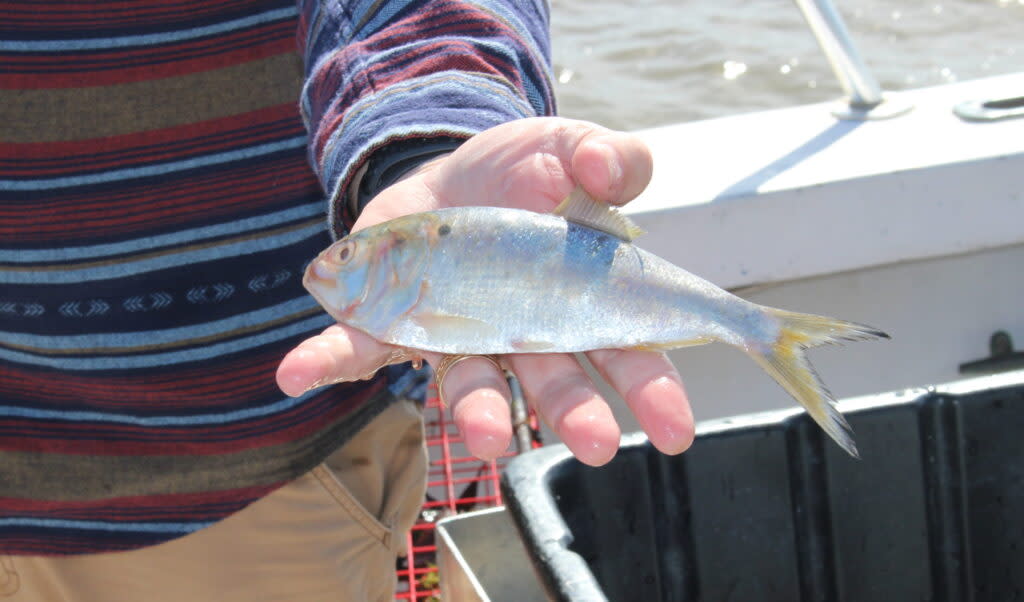Defendants seek dismissal of lawsuit alleging fraudulent ownership scheme of Omega Protein

A menhaden pulled from the Chesapeake Bay in the area of Jordan Point Marina. (Charlie Paullin / Virginia Mercury)
A company created during the 2017 sale of Omega Protein, the lone menhaden reduction fishery in the Chesapeake Bay, is seeking a dismissal of a lawsuit alleging that it lied about its corporate structure to evade the U.S. citizenship requirements.
On July 9, Ocean Fleet Services and several other defendants named in the suit filed a motion to dismiss the lawsuit in the U.S. District Court for the District of Southern New York brought forward by the two plaintiffs, Benson Chiles and Chris Manthey.
Chiles and Manthey, two private investigators involved in environmental conservation, accused the company of violating the False Claims Act by not revealing its foreign ownership, as required under American Fisheries Act and Jones Act in order to fish in the U.S.
But Ocean Fleet Services, after filing its motion, said in a statement, “From the moment we became aware of this case, we have been eager to show that the allegations are inaccurate.”
“Our legal filing underscores several key misstatements from the complaint and offers concrete evidence that they are false,” the statement continued.
The lawsuit is among the several disputes involving Omega Protein, which catches menhaden — the tiny nutrient-rich fish that environmental and conservation groups say are being overfished in the Chesapeake Bay — and reduces them down to fishmeal and oil.
The critics say the loss of menhaden in the Bay affects the food chain for striped bass, which are falling prey to overfishing, and osprey. Meanwhile, the Reedville-based company says it needs to fish in the Bay west of the Eastern Shore to avoid unsafe conditions in the Atlantic Ocean and continue to provide jobs to watermen, as it has for decades.
A study to determine the impacts of Omega’s activity on menhaden in the Bay was left unfunded this past legislative session.
As it relates to the lawsuit, the American Fisheries Act requires that at least 75% of an entity fishing in the U.S. be owned by a U.S. citizen, while the Jones Act requires vessels transporting cargo within U.S. points be owned and operated by a U.S. citizen.
The lawsuit alleged that when Canadian-based Cooke Inc. acquired Omega Protein in December 2017, the company created another company, Alpha Vessels, also known under the business name Ocean Harvesters, to run the ships that catch the menhaden and sell them to Omega. Ocean Harvesters was then sold to Ocean Fleet Services, with American Seth Dunlop having 80% ownership of it.
Dunlop, though, is the nephew of Glenn Cooke, CEO of Cooke Inc. the plaintiffs argued, and was placed as a figurehead of Ocean Fleet Services to get around the U.S. citizenship requirement while still funneling profits back to the international company.
Ocean Fleet Services, in its filing, counters that the fishing licenses the federal Maritime Administration (MARAD) issued aren’t money or property, which, if obtained fraudulently, would have violated the False Claims Act.
Further, Ocean Fleet Services lawyers state that the plaintiffs provide no proof to the allegation that MARAD didn’t know about the familial relationship when approving the fishing licenses. In July and October 2017, Ocean Harvesters, the company sold to Ocean Fleet Services, submitted letters to MARAD stating Dunlop is “related by marriage to one of the three family members that control Cooke,” Ocean Fleet Services’ attorneys argue.
“As a general principle, [False Claim Act] pleadings cannot be based upon information and belief,” wrote K&L Gates attorney Robert S. Silverblatt on behalf of the defendants. “[Plaintiffs’] method of pleading runs headfirst into these guardrails. … Virtually every allegation that [plaintiffs] make about the nature of disclosures to the government is made on information and belief,’” Silverblatt wrote.
An attempt to reach the attorney for the plaintiffs for comment was unsuccessful Monday.
Steve Atkinson, chairman of the Virginia Saltwater Sportfishing Association, has previously questioned whether Omega Protein should be able to send profits to a Canadian firm and has called for the company to leave the Bay so research can be conducted to see the company’s impact on menhaden.
“We have been concerned about industrial menhaden fishing practices for years,” Atkinson said. “If this global fishing conglomerate is in violation of the laws, they need to be held accountable.”
The plaintiffs will have until July 30 to amend their initial complaint. A next court date hasn’t been set.
The post Defendants seek dismissal of lawsuit alleging fraudulent ownership scheme of Omega Protein appeared first on Virginia Mercury.

